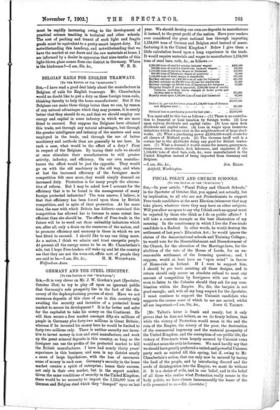GERMANY AND THE STEEL INDUSTRY.
LTO TIM EDITOR OF TUB " SPECTATOR." J
SIB,—It is very clever on Mr. J. W. Gordon's part (Spectator, October 31st) to try to play off upon an ignorant public that Germany's sole prosperity lies in the fact of the dis- covery of the dephosphorising process of steel. Have we not enormous deposits of this class of ore in this country only awaiting the security and incentive of a protected home market to secure its development ? It is far better and safer for the capitalist to take his money on the Continent. He will then secure a free market amongst fifty-six millions of people in Germany plus forty-two millions in Great Britain; whereas if he invested his money here he would be limited to forty-two millions only. There is neither security nor incen- tive to invest money in iron and steel manufacture, and work up the great mineral deposits in this country. so long as the foreigner can use the profits of his protected market to kill the British manufacturer. I have had nearly thirty years' experience in this business, and seen in my district nearly a score of large liquidations, with the loss of enormous sums of money in each case. Germany's security in the home market creates a spirit of enterprise ; hence their success, not only in their own market, but in the export market. Given the same conditions of security in the United Kingdom, there would be no necessity to import the 1,134,000 tons of German and Belgian steel which they "dumped" upon us last
year. We should develop our own ore deposits to manufacture it instead, to the great profit of the nation. Have your readers ever considered the great national loss through importing 1,134,000 tons of German and Belgian steel instead of manu- facturing it in the United Kingdom? Below I give them a little calculation based upon a long experience in the . trade. It would require materials and wages to manufacture 1,134,000 tons of steel bars, rods, &c., as follows :—
2,200,000 tons of coal for mining (miners' wages) ... A445,000
500,000 tons of coal for steelworks (miners' wages) ... 100,000
1,250,000 tons of pig-iron (wages at furnaces) ... ... 250,000 600,000 tons of limestone (wages at quarries) .. ... 30,000 1,134,090 tons of steel (wages in steelwork) ... ... .. 680,000
Railway carriage on L400,000 tens of coke for furnaces ... 420,000 Railway carriage on 500,000 tons of coal for steelworks ... 25,000 Railway carriage on 500,000 tons of limestone for furnaces ... 30,000
Shipping freight if ore is imported ; 2,500,000 tons of ore for . furnaces, inclndingkslabour charges at home ports and railway rate to 975,0130
Royalty rents upon 3,900,000 tons of coal and limestone ... 82,500 Deduct 5s. per ton for lower price of 1,134,000 tons of German
and National loss in purchasing power for last year... ... £2,654,000
You must add to this loss as follows :—(1) There is no contribu- tion to Imperial or local taxation by foreign works. (2) Loss upon railway dividends and capital value. (3) Loss upon dock dividends and capital value. (4) Loss in wages upon numerous industries which always exist in the neighbourhood of large steel- works. (5) What a purchasing power £2,654,000 would create for all classes of Midland goods. (6) The German tariff wall is a certain bar to the .62,654,000 doing any good for British trades- men. (7) What a demand it would create for miners, quarrymen, furnacemen, steelworkers, dock labourers, and engineers if the 1,134,000 tons of steel bars, rods, Sm., were manufactured in the United Kingdom instead of being imported from Germany and Belgium.
£2,937,500
Ashfield, Workington.






























































 Previous page
Previous page